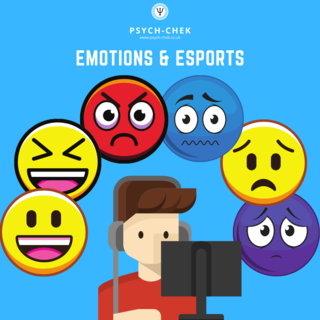Anger
Emotions and Esports
Positive and negative emotions in esports.
Posted April 26, 2021 Reviewed by Ekua Hagan
Key points
- New research highlights the positive effects of video games on human emotions. For instance, playing some video games makes gamers happier.
- A study of gamers who played "Counter-Strike: Global Offensive" revealed many positive emotions as a result of competition and cooperation.
- Another study found that gamers who experienced positive emotion during the game played better.
This blog post was written by Dr. Maciej Behnke and Professor Lukasz D. Kaczmarek.
During esports events, gamers and spectators experience intense positive emotions (excitement, joy, or pride) and intense negative emotions (fear, anger, or sadness). Games influence emotions, but a lesser-known fact is that emotions influence gaming outcomes.

The abundance of emotions in esports
Non-gamers sometimes view gaming and esports through the lens of prejudice and negative stereotypes. Research on gaming emotions has been biased towards the negative consequences of playing video games. Mass media also emphasize negative aspects of gaming and neglect its benefits.
For instance, researchers have linked the presence of disfigured humans and zombies with fear and the game's violent content (e.g., graphic presentation of death) with increased emotional arousal. Studies have also identified specific gaming behaviors that elicit negative emotions, such as poor communication, criticism within the team, underperforming, and losing matches they were expected to win. So it’s not surprising that many people imagine game-related emotions through the lens of rage-quitting—the act of disconnecting gaming equipment, sometimes violently.
Fortunately, recent research has begun to highlight the positive effects of video games on human emotions. For instance, playing some video games makes gamers happier, less distressed, and less frustrated. Even playing violent games has the potential to increase positive emotions.
Several studies have indicated that playing video games was related to stronger resilience in crisis times (as is the case for COVID-19). Gamers indicate that playing against "evil" elicits positive emotions. To balance the research on positive and negative emotions in esports, we examined game situations that evoke amusement, enthusiasm, sadness, and anger in a popular esports game—Counter-Strike: Global Offensive.
Players reported several situations that kept them amused and enthusiastic. No wonder victories (especially by the clutch) provide intense positive emotions. Competitive and close matches under pressure boosted gaming enthusiasm. Ridiculous shots, wall bangs, and stupid mistakes such as team kills often resulted in amusement. Yet, gamers also experience positive emotions when playing with friends or communicating well with others, and cooperating.
Playing with weak teammates or losing a game that promised to be a winner were the most common reasons why gamers felt angry and sad. Playing against hackers, someone sabotaging a team-play, or the internet lagging were other anger-eliciting scenarios. Of note, 1 out of 10 gamers reported never feeling sad while gaming!
Emotions help gamers win
Emotions are a part of a competition. Players focus on different things before the match that form a specific emotional background for their performance. Thinking, moving, and physiological responding reflect gamers' emotions. Few experimental studies have examined how discrete emotions influence sports performance.
Some studies have shown that inducing happiness, but also anger, facilitates athletes' actions. Are similar outcomes present in esports? We ran two large laboratory experiments and found that a positive mindset and positive emotions improve gaming performance. We found that for FIFA 19 and Counter-Strike: Global Offensive, gamers with a positive approach played better. When we elicited positive emotions (especially enthusiasm) in FIFA gamers, players were more likely to win! They also fouled other players less often!

Final words
We have increasing scientific evidence that esports provide diverse emotional experiences and that positive emotions contribute to better performance. To the best of our knowledge, a smart thing a player can do before the match is to focus on positive things. For instance, it might be helpful to include enthusiasm elicitation in your pre-performance routines. The gaming advantage can be subtle, but it can give you extra milliseconds that differentiate between the best and good gamers.


